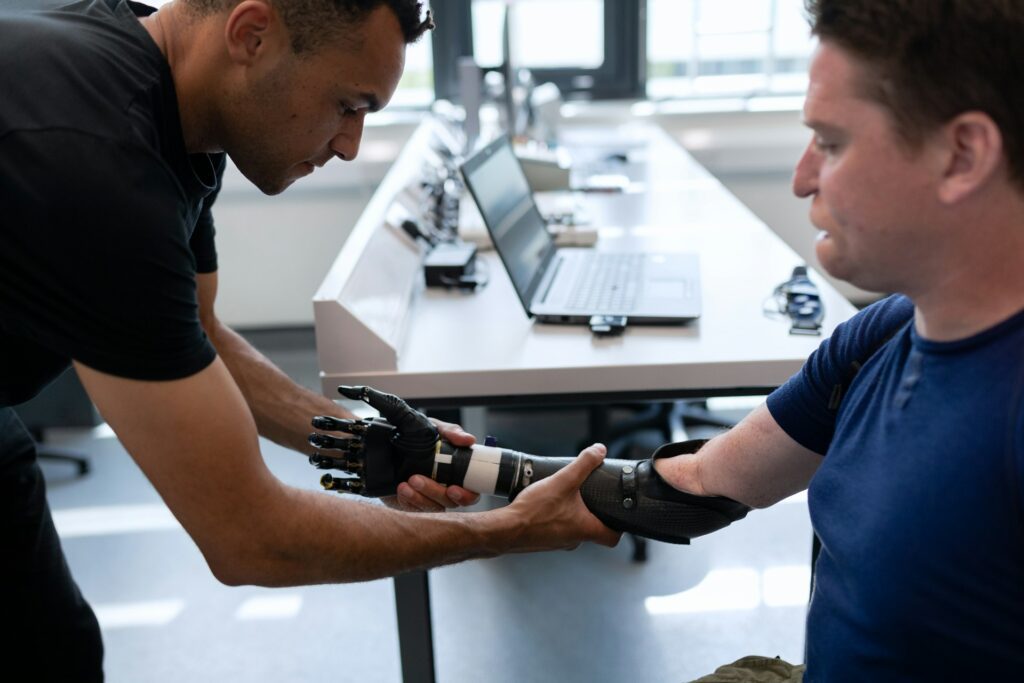During April’s Limb Loss and Limb Difference Awareness Month, the Amputee Coalition celebrates significant legislative victories, including new state laws enhancing prosthetic access.
Since 1997, Limb Loss and Limb Difference Awareness Month has been instrumental in raising awareness about the lives, needs, and challenges of those individuals who have limb loss and/or limb difference. With awareness campaigns, the Amputee Coalition’s goal is “centering the voice of the individuals who are sharing their stories and talking about their experiences,” Shree Thaker, Amputee Coalition Director of Communications and Partnerships, told Bio.News. “And that oftentimes comes with both the ups and the downs of their journeys.”
Bio.News caught up with the Amputee Coalition to discuss the latest news and the importance of awareness and advocacy in advancing patient access and improving the lives of those with limb loss and limb difference.
Amputee Coalition sees momentum on access in the states
“On the state front, one of the most successful campaigns that the Amputee Coalition has ever been involved in has been its insurance fairness work,” said Ashlie White, Chief Strategy and Programs Officer. This is essential for those living with limb loss and limb difference “to make sure that individuals have access to the appropriate prosthetic, orthotic, and assistive technologies they need to live the lives that they choose to live.”
White also pointed to the So Every BODY Can Move initiative and the “28 x 28” goal to pass “So Every BODY Can Move” legislation in 28 states ahead of the 2028 Los Angeles Paralympics. So Every BODY Can Move is committed to creating coverage for medically necessary prosthetic and orthotic care in the aforementioned 28 states, so as to then pursue reform at the federal level. The Amputee Coalition is joined in this initiative by the American Orthotic & Prosthetic Association (AOPA), the National Association for the Advancement of Orthotics & Prosthetics (NAAOP), and the American Academy of Orthotists and Prosthetists (AAOP).
So far, five states have signed bills into law: Maine (May 2022), Arkansas (April 2023), New Mexico (April 2023), Colorado (May 2023), and Illinois (August 2023).
Additionally, in April 2024, the Maryland State Legislature passed ‘The Maryland Medical Assistance Program and Health Insurance Coverage for Prostheses (So Every BODY Can Move Act).’ This legislation now awaits Maryland Governor Wes Moore’s signature.
What the Amputee Coalition is watching at the federal level
At the federal level, the Amputee Coalition expects the introduction of federal insurance fairness legislation, and continues to put a focus on “resourcing for research,” including work on antimicrobial resistance (AMR), said White.
She also noted the importance of the Triple A Study Act in the previous Congress. While the legislation did not pass, patients nonetheless benefitted as “our champions in the Senate and the House sent a letter to the Government Accountability Office (the GAO) to initiate that investigation to look at lacks of access in the continuum of care for people who have lost arms and legs,” White explained.
“The Triple A Study Act was designed to force that investigation to occur, but Congress can also initiate those investigations on their own,” White added. “Senators [Tammy] Duckworth (D-IL) and [Marsha] Blackburn (R-TN) went ahead and initiated the bipartisan, bicameral request to the GAO. And so that study has actually wrapped; we have heard that we should anticipate a report,” continued White.
Finally, the Amputee Coalition is working to make the National Limb Loss Resource Center resources more widely accessible digitally. The center is the only federally funded organization that provides certified peer visitation, peer support, self-advocacy training and education, policy advocacy training, youth programming and engagement, and workforce development.
The importance of community and connection
The theme of the Amputee Coalition’s upcoming National Conference in Atlanta in August is ‘celebrating connection’. The goal of the conference, Thaker explained, is “for people to have their community, to feel represented, to not feel alone.” The conference is also an opportunity for attendees to hear from different voices—such as BIO Senior Director of Infectious Disease Policy, Emily Wheeler, who spoke about the impact of AMR at the 2023 National Conference.
The Coalition’s commitment extends to the veteran community, playing a crucial role in policy advocacy as well as peer support with a contract with the Department of Veterans Affairs to provide peer visitor training. Additionally, Thaker cited the Amputee Coalition’s partnership with the EACE, the Extremity Trauma and Amputation Center of Excellence under the Defense Health Agency (DHA).
“There’s a very holistic intersection here of how we support the veteran population,” Thaker noted.
Amidst the dynamics of an election year, the Amputee Coalition maintains a nonpartisan approach, focusing on policy impacts rather than political debates.
The most important thing, the organization tells advocates, is that when telling your story and engaging in advocacy, “it’s not politics, it’s policy. And that all policy is personal,” said White.
It “doesn’t matter who’s in office, and where, and for how long,” added Thaker. The Amputee Coalition’s work is “necessary.”
The ongoing partnership with BIO is instrumental in elevating patient advocacy and tackling access issues within the healthcare system.
Organizations like BIO “are doing a great job of elevating patient advocacy voices,” said White, “putting us at a table to have conversations with each other about what we’re doing to combat some of these challenges that we’re seeing from an access perspective.”
“I’m grateful for the partnership with BIO,” White added.
Learn more about the Amputee Coalition’s work at www.amputee-coalition.org.




